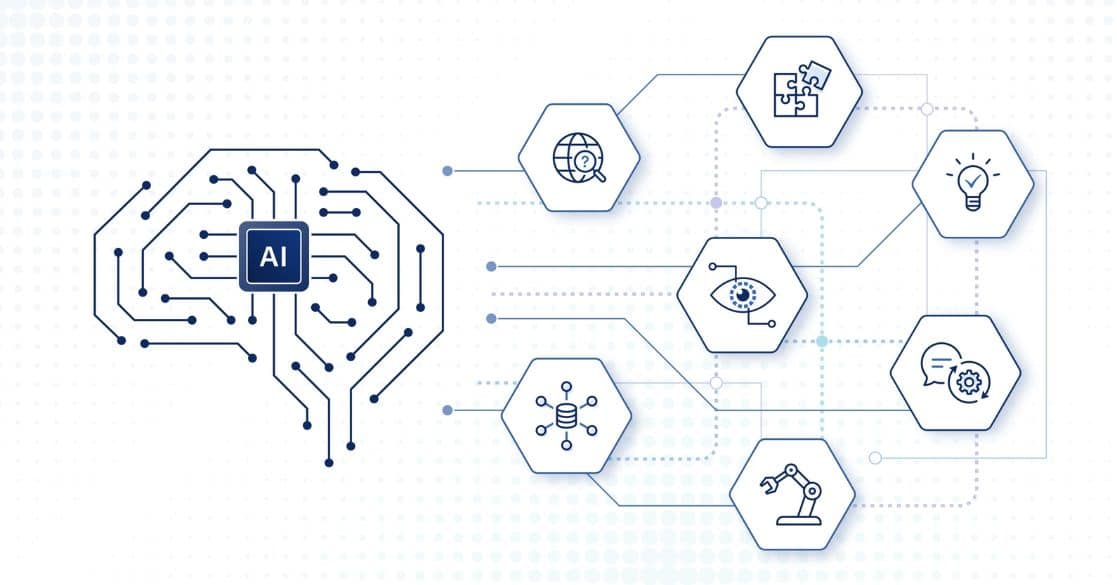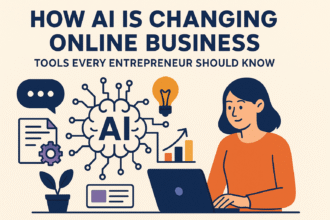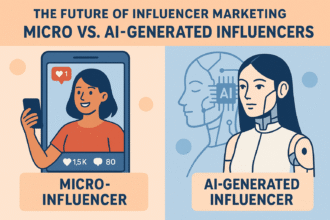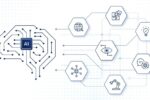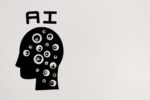The artificial intelligence revolution is no longer a distant possibility—it’s happening right now, fundamentally reshaping the global job market in ways both profound and permanent. As we navigate through 2025, the impact of AI on employment has become one of the most critical issues of our time, affecting millions of workers across every industry and skill level.
According to a report from the World Economic Forum, while AI and robotics will displace 85 million jobs by 2025, they’re also projected to create 97 million new roles in areas like AI development, data science, and human-AI collaboration. This statistic reveals the dual nature of the AI revolution: it’s simultaneously a destroyer and creator of employment opportunities.
Understanding which careers will thrive and which face extinction has become essential for anyone planning their professional future. The jobs most vulnerable to AI replacement share common characteristics: they involve routine tasks, predictable patterns, and minimal human interaction. Conversely, the careers that will flourish require uniquely human skills like creativity, emotional intelligence, complex problem-solving, and ethical reasoning.
The transformation isn’t just about job displacement—it’s about evolution. Many existing roles will adapt and integrate AI tools, while entirely new professions emerge to support our AI-powered economy. This comprehensive analysis will help you navigate these changes and make informed decisions about your career path in an AI-dominated world.
The AI Job Market Transformation: Understanding the Scope
The Scale of Change
A Goldman Sachs analysis warns that AI could displace 300 million jobs worldwide as automation accelerates, highlighting the unprecedented scale of this technological shift. However, this disruption isn’t uniform across industries or job types. The availability of data is what defines which industries are most disrupted by AI. Job-seekers must focus on opportunities that combine tech capabilities with human judgement and business needs.
The manufacturing sector exemplifies this trend. MIT research shows AI will replace 2 million manufacturing workers by 2025. But finance jobs might disappear even faster because everything is data-based. These repetitive task jobs are AI’s easiest targets. This data-driven vulnerability extends beyond manufacturing into any sector where tasks can be reduced to patterns and algorithms.
The Skills Revolution
Project management and UX design are among the most recommended upskilling paths for U.S. workers in 2025. Lifelong learning and upskilling are now a top priority for 75% of U.S. employers. This statistic underscores a fundamental shift in how we approach career development—the era of static skill sets is over.
The new economy rewards adaptability, continuous learning, and the ability to work alongside AI systems rather than compete against them. Workers who embrace this collaborative approach position themselves for long-term success, while those who resist face increasing marginalization in the job market.
10 Careers That Will Thrive in the AI Era
1. AI and Machine Learning Specialists
Demand for roles driven by technological advancements such as artificial intelligence (AI) is quickly increasing. These jobs include big data specialists, fintech engineers and AI and machine learning specialists. As the architects of AI systems, these professionals remain irreplaceable, designing, training, and optimizing the very technologies reshaping our world.
AI specialists command premium salaries and enjoy exceptional job security because they create the tools that other industries depend upon. Their expertise spans multiple disciplines, including computer science, statistics, and domain-specific knowledge, making them valuable across virtually every sector.
The role continues evolving as AI technology advances. Today’s machine learning engineers work on everything from natural language processing to computer vision, autonomous systems to recommendation algorithms. Their work directly impacts how AI integrates into society, making them key players in shaping our technological future.
2. Data Scientists and Big Data Specialists
In our data-driven economy, professionals who can extract meaningful insights from vast information repositories have become indispensable. Data scientists bridge the gap between raw information and actionable business intelligence, using statistical analysis, machine learning, and domain expertise to solve complex problems.
The explosion of data generation across all industries ensures sustained demand for these professionals. From healthcare analytics to financial modeling, from marketing optimization to scientific research, data scientists provide the analytical foundation for informed decision-making in the AI age.
Advanced analytics, predictive modeling, and data visualization skills make these professionals essential to organizations seeking competitive advantages. Their ability to translate complex statistical findings into business strategies positions them as strategic advisors rather than mere technical specialists.
3. Cybersecurity Experts and Ethical AI Specialists
From ethical AI specialists to marketing strategists and machine learning engineers, these AI jobs offer the chance to work at the forefront of technology while building a rewarding career. As AI systems become more powerful and pervasive, ensuring their security and ethical operation becomes paramount.
Cybersecurity professionals specializing in AI protection face unique challenges. They must defend against adversarial attacks, prevent data poisoning, and secure machine learning models from manipulation. Their expertise becomes more valuable as organizations realize that AI systems can be vulnerable in ways traditional software isn’t.
Ethical AI specialists ensure that artificial intelligence systems operate fairly, transparently, and without harmful bias. They develop governance frameworks, conduct algorithmic audits, and guide organizations through the complex ethical considerations of AI deployment. This role combines technical knowledge with philosophical understanding, making it particularly resistant to automation.
4. Healthcare Professionals with AI Integration Skills
Healthcare represents one of the most promising sectors for AI-human collaboration. Medical professionals who understand how to leverage AI diagnostic tools, treatment recommendation systems, and patient monitoring technologies will lead the transformation of healthcare delivery.
Physicians, nurses, and healthcare administrators who combine clinical expertise with AI literacy can provide more accurate diagnoses, personalized treatments, and efficient care coordination. AI amplifies their capabilities rather than replacing them, enabling them to serve more patients with better outcomes.
Specialized roles emerge within healthcare AI, including clinical data scientists, AI-assisted surgery coordinators, and personalized medicine specialists. These positions require deep medical knowledge combined with understanding of how AI systems can enhance patient care.
5. Creative Professionals and Content Strategists
Contrary to early predictions, creative professions are adapting to AI rather than being replaced by it. Graphic designers, writers, marketing strategists, and content creators who learn to collaborate with AI tools can dramatically increase their productivity and creative output.
The key lies in understanding AI as a creative partner rather than a threat. Writers can use AI for research and ideation while applying human creativity to develop original concepts. Designers can leverage AI for rapid prototyping while focusing on strategic creative decisions and brand storytelling.
Content strategists who understand both human psychology and AI capabilities can create more effective campaigns, develop better audience targeting, and optimize content performance across multiple channels. Their strategic thinking and understanding of human behavior remain irreplaceable.
6. Human Resources and Organizational Development Specialists
The integration of AI into workplaces creates new challenges in human resource management. HR professionals who understand AI’s impact on organizational culture, employee development, and workforce planning become increasingly valuable.
These specialists help organizations navigate the human side of digital transformation. They design retraining programs, manage AI adoption change management, and develop policies for human-AI collaboration. Their understanding of both technology and human psychology makes them essential bridge-builders.
Specialized roles include AI ethics officers within HR, human-AI collaboration consultants, and workforce transformation specialists. These positions require deep understanding of organizational behavior combined with knowledge of AI capabilities and limitations.
7. Mental Health and Social Services Professionals
As society grapples with AI’s psychological and social impacts, mental health professionals become more critical than ever. Therapists, counselors, and social workers provide the human connection and emotional support that AI cannot replicate.
The stress of technological unemployment, AI anxiety, and digital overwhelm creates new mental health challenges requiring professional intervention. Therapists who understand these technology-related stressors can provide more effective treatment and support.
Specialized practice areas emerge, including technology addiction counseling, AI-anxiety therapy, and digital wellness coaching. These professionals help individuals and communities navigate the psychological challenges of living in an AI-dominated world.
8. Skilled Trades and Technical Specialists
Physical trades requiring manual dexterity, problem-solving, and adaptability remain largely automation-resistant. Electricians, plumbers, HVAC technicians, and other skilled trades professionals continue experiencing strong demand as AI focuses primarily on information-based tasks.
These professionals increasingly incorporate smart technologies into their work without being replaced by them. They install and maintain AI-powered building systems, work with Internet of Things devices, and adapt traditional trades to smart home and smart city technologies.
The complexity and variability of real-world physical problems make these roles particularly resistant to automation. While robots can perform specific manufacturing tasks, the unpredictable nature of field service work requires human adaptability and problem-solving skills.
9. Education and Training Specialists with AI Literacy
The massive need for workforce retraining creates enormous opportunities for education professionals who understand both pedagogy and AI technology. These specialists design curricula, deliver training programs, and help workers transition to new roles in the AI economy.
Specialized educational roles include AI literacy instructors, corporate learning and development specialists, and educational technology coordinators. These professionals must understand how people learn while staying current with rapidly evolving AI technologies.
Online education platforms, corporate training programs, and professional development initiatives all require experts who can bridge the gap between complex AI concepts and practical application. Their role becomes more critical as the pace of technological change accelerates.
10. AI Integration Consultants and Change Management Specialists
Organizations across every industry need guidance on how to integrate AI technologies effectively. Consultants who understand both AI capabilities and organizational dynamics help businesses navigate this complex transformation.
These professionals assess organizational readiness for AI adoption, develop implementation strategies, and manage the cultural changes required for successful AI integration. They combine technical knowledge with deep understanding of business operations and human psychology.
Specialized consulting areas include AI project management, digital transformation strategy, and AI governance consulting. These roles require the ability to translate between technical teams and business stakeholders while managing the human elements of technological change.
10 Careers at Risk of AI Displacement
1. Data Entry and Administrative Support Roles
Administrative tasks involving routine data processing represent some of the most vulnerable positions in the AI revolution. Previous research indicates that many roles typically filled by women, including administrative and customer service roles, are being automated away by new technology. These positions involve predictable, rule-based activities that AI systems can perform more efficiently and accurately than humans.
Data entry clerks, filing assistants, and basic administrative support roles face near-term displacement as natural language processing and optical character recognition technologies mature. Organizations can achieve significant cost savings by automating these functions while reducing human error.
However, this doesn’t mean all administrative roles will disappear. Higher-level administrative positions requiring judgment, client interaction, and complex problem-solving may evolve rather than vanish entirely. The key distinction lies in the complexity and variability of the tasks involved.
2. Basic Customer Service Representatives
IBM’s AskHR handles 11.5 million interactions annually with minimal human oversight, demonstrating AI’s capability to manage routine customer inquiries effectively. Chatbots and virtual assistants can handle increasingly sophisticated customer service interactions, from account inquiries to basic troubleshooting.
First-level customer service representatives handling routine inquiries face significant displacement risk. AI systems can provide 24/7 availability, consistent responses, and immediate access to vast knowledge bases without the variability associated with human representatives.
Complex customer service roles involving emotional support, relationship building, and advanced problem-solving remain more secure. However, even these positions may evolve to focus on escalated issues while AI handles routine interactions.
3. Retail Sales Associates and Cashiers
The World Economic Forum has estimated that artificial intelligence will replace some 85 million jobs by 2025. Freethink says that 65% of retail jobs could be automated by that year, highlighting the vulnerability of traditional retail positions.
Self-checkout systems, automated inventory management, and AI-powered recommendation engines reduce the need for human sales associates in many retail environments. E-commerce platforms already demonstrate how AI can handle product recommendations, customer inquiries, and transaction processing.
However, luxury retail, complex product sales, and relationship-based selling may continue requiring human expertise. The key factor is whether the role involves routine transactions or complex customer relationship management.
4. Basic Bookkeeping and Accounting Clerks
Financial record-keeping and basic accounting functions represent prime targets for AI automation. Software can automatically categorize transactions, reconcile accounts, and generate basic financial reports with greater accuracy and speed than human clerks.
Entry-level bookkeeping positions face particular risk because they involve predictable, rule-based activities that AI systems can perform continuously without breaks or errors. Automated accounting systems can process thousands of transactions while human bookkeepers handle dozens.
Higher-level accounting positions involving analysis, tax strategy, and financial planning remain more secure, but even these roles will likely incorporate AI tools to automate routine calculations and data processing tasks.
5. Manufacturing Assembly Line Workers
MIT research shows AI will replace 2 million manufacturing workers by 2025, particularly those in routine assembly operations. Robotic systems combined with AI coordination can perform repetitive manufacturing tasks with precision, consistency, and endurance that exceed human capabilities.
Assembly line workers performing repetitive motions face displacement as robotics technology advances and costs decrease. Automated systems can work continuously, maintain consistent quality, and adapt to production changes without requiring breaks or shift changes.
However, manufacturing roles requiring complex problem-solving, quality assessment, and maintenance skills may persist. The key distinction is between routine, repetitive tasks and variable, skilled activities requiring human judgment.
6. Insurance Claims Processors and Underwriters
Insurance industry automation focuses heavily on claims processing and risk assessment—areas where AI excels at pattern recognition and data analysis. Automated systems can evaluate claims against policy terms, assess risk factors, and determine appropriate payouts without human intervention.
Basic insurance underwriting involves analyzing data patterns and applying predetermined rules—activities well-suited to AI automation. Machine learning algorithms can assess risk more consistently than human underwriters while processing applications much faster.
Complex insurance situations involving unusual circumstances, legal complexities, or customer relations may continue requiring human expertise. However, the volume of routine processing work will likely decrease significantly.
7. Bank Tellers and Loan Processors
Banking operations involving routine transactions face significant automation pressure. Mobile banking, ATMs, and automated loan processing systems can handle most basic banking functions without human tellers.
Loan processing particularly suits AI automation because it involves analyzing financial data, credit scores, and risk factors according to established criteria. AI systems can evaluate loan applications, verify information, and make approval decisions faster than human processors.
While complex banking relationships and financial advisory services may continue requiring human expertise, routine transaction processing and basic loan evaluation face near-term displacement.
8. Transportation and Delivery Drivers
Autonomous vehicle technology poses a long-term threat to driving professions, though the timeline for complete displacement varies by application. Long-haul trucking may face automation sooner than local delivery or ride-sharing services due to the more predictable nature of highway driving.
Delivery drivers face challenges from both autonomous vehicles and drone delivery systems. As last-mile delivery automation improves, the need for human drivers may decrease significantly, particularly for routine package delivery routes.
However, driving roles requiring customer interaction, complex route decisions, or handling of specialized cargo may persist longer. The transition timeline depends on technological development, regulatory approval, and consumer acceptance of autonomous systems.
9. Market Research Analysts (Basic Level)
Entry-level market research involving data collection, survey processing, and basic statistical analysis faces automation as AI systems become more sophisticated at handling large datasets and identifying patterns.
AI can process vast amounts of market data, social media sentiment, and consumer behavior information faster and more comprehensively than human researchers. Automated systems can identify trends, correlations, and insights that might escape human analysis.
However, strategic market research requiring creative thinking, hypothesis development, and business insight interpretation may continue requiring human expertise. The distinction lies between data processing and strategic interpretation of research findings.
10. Proofreaders and Copy Editors (Basic Level)
Language processing AI has reached sophisticated levels in grammar checking, style consistency, and basic editing tasks. Automated proofreading tools can identify errors, suggest corrections, and maintain style guidelines with increasing accuracy.
Basic proofreading and copy editing roles face displacement as AI writing assistants become more capable. These systems can check grammar, spelling, punctuation, and style consistency while working continuously without fatigue or oversight.
However, editing roles requiring creative judgment, brand voice development, and complex content strategy may persist. The key distinction is between mechanical error correction and editorial decision-making requiring human creativity and strategic thinking.
Strategies for Career Future-Proofing
Developing AI-Resistant Skills
The most effective career protection strategy involves developing skills that complement rather than compete with AI capabilities. Emotional intelligence, creative problem-solving, ethical reasoning, and complex interpersonal communication represent uniquely human strengths that AI cannot easily replicate.
Critical thinking skills become particularly valuable in an AI-dominated world. While AI systems can process information and identify patterns, humans excel at questioning assumptions, considering ethical implications, and making nuanced judgments based on incomplete information.
Leadership and management capabilities also provide protection against automation. Managing teams, inspiring creativity, and navigating organizational politics require human understanding of motivation, culture, and interpersonal dynamics that AI cannot fully comprehend.
Embracing AI as a Collaborative Tool
Rather than viewing AI as a threat, successful professionals learn to leverage AI capabilities to enhance their own productivity and effectiveness. This collaborative approach transforms AI from a replacement risk into a competitive advantage.
Learning to prompt AI systems effectively, understanding their capabilities and limitations, and integrating AI tools into daily workflows becomes a fundamental professional skill. Workers who master human-AI collaboration will outperform both those who ignore AI and those replaced by it.
The key is maintaining human oversight and judgment while leveraging AI for data processing, routine tasks, and analytical support. This partnership approach maximizes the strengths of both human and artificial intelligence.
Continuous Learning and Adaptation
Lifelong learning and upskilling are now a top priority for 75% of U.S. employers, reflecting the reality that static skill sets no longer provide career security. The pace of technological change requires continuous education and skill development throughout one’s career.
Professional development must focus on both technical skills and adaptability. Understanding emerging technologies, developing digital literacy, and maintaining learning agility become more important than mastering any specific tool or platform.
Creating personal learning systems, joining professional networks, and staying informed about industry trends help professionals anticipate changes and adapt proactively rather than reactively.
Building Human-Centric Value
The careers most resistant to AI displacement provide value that is fundamentally human in nature. This includes emotional support, creative inspiration, ethical guidance, and complex relationship management—areas where human connection remains irreplaceable.
Developing expertise in human psychology, cultural understanding, and emotional intelligence creates value propositions that AI cannot replicate. These skills become more valuable as technology handles routine tasks, leaving humans to focus on uniquely human contributions.
Personal branding around human-centric skills helps differentiate professionals in an increasingly automated world. Demonstrating empathy, creativity, and ethical reasoning becomes a competitive advantage in the AI economy.
Industry-Specific Transformation Patterns
Healthcare: Enhancement vs. Replacement
Healthcare exemplifies how AI can enhance rather than replace human expertise. Diagnostic AI assists doctors but doesn’t eliminate the need for medical judgment, patient communication, and treatment planning. The industry moves toward AI-augmented practice rather than AI replacement.
Medical professionals who embrace AI diagnostic tools, treatment recommendation systems, and patient monitoring technologies can provide better care while serving more patients. The key is maintaining human oversight and patient relationships while leveraging AI capabilities for enhanced clinical decision-making.
Specialized healthcare AI roles emerge, including clinical data scientists, AI-assisted surgery coordinators, and personalized medicine specialists. These positions combine medical expertise with AI literacy, creating new career pathways within healthcare.
Finance: Automation with Oversight
Financial services demonstrate both high automation potential and continued need for human expertise. While AI can process transactions and assess basic risk, complex financial planning, client relationships, and regulatory compliance require human judgment.
Financial professionals adapting to AI integration can serve more clients with better analytical support while focusing on strategic advice and relationship management. The value shifts from transaction processing to strategic consultation and personalized service.
New financial roles emerge around AI governance, algorithmic trading oversight, and fintech development. These positions require both financial expertise and understanding of AI systems’ capabilities and limitations.
Education: Personalization and Guidance
Educational technology creates opportunities for more personalized learning experiences while increasing demand for human educators who can provide mentorship, motivation, and emotional support that AI cannot replicate.
Teachers who integrate AI tutoring systems, adaptive learning platforms, and educational analytics can provide more effective instruction tailored to individual student needs. The role evolves from information delivery to learning facilitation and personal development guidance.
Educational AI specialists, learning experience designers, and digital pedagogy experts represent growing career areas that combine educational expertise with technology understanding.
The Economic Impact of AI Job Transformation
Job Creation vs. Displacement
While AI and robotics will displace 85 million jobs by 2025, they’re also projected to create 97 million new roles, suggesting that the AI revolution will ultimately create more jobs than it eliminates, though not necessarily for the same workers.
The challenge lies in the skills gap between displaced workers and newly created positions. Many new AI-era jobs require technical skills, advanced education, or specialized training that displaced workers may not possess, creating potential for increased inequality.
Successful navigation of this transition requires massive retraining initiatives, educational system adaptation, and social support for workers changing careers. The economic benefits of AI adoption must include investment in human capital development.
Wage and Income Effects
AI’s impact on wages varies significantly by skill level and industry. High-skill workers who successfully integrate AI tools may see income increases due to enhanced productivity, while those in easily automated roles face income pressure.
The polarization between high-skill, high-wage positions and lower-skill service jobs may intensify as middle-skill routine positions face automation. This trend requires policy responses to ensure broad-based economic benefits from AI advancement.
Income support systems, progressive taxation, and wealth redistribution mechanisms may become necessary to manage AI’s economic disruption while ensuring that productivity gains benefit society broadly rather than concentrating among technology owners.
Regional and Global Implications
AI adoption rates vary significantly by region, industry, and organizational size. Areas with strong technology infrastructure and educated workforces may benefit while others face greater displacement challenges.
Developing nations may face particular challenges if AI automation reduces demand for manufacturing labor, potentially disrupting economic development strategies based on low-cost production. However, AI tools may also enable leapfrog development in some sectors.
International cooperation on AI governance, worker protection, and equitable development becomes crucial to managing global transformation effects and preventing increased international inequality.
Preparing Organizations for AI Transformation
Change Management Strategies
Organizations must develop comprehensive strategies for integrating AI while managing workforce transitions. This includes identifying which roles will change, what new skills employees need, and how to maintain morale during transformation.
Successful AI adoption requires cultural change that embraces human-machine collaboration rather than fearing replacement. Organizations must communicate clearly about AI’s role, provide training opportunities, and demonstrate commitment to employee development.
Change management programs should include retraining initiatives, career pathway planning, and support for employees transitioning to new roles. The most successful organizations view AI adoption as a workforce development opportunity rather than a cost reduction exercise.
Ethical AI Implementation
Organizations implementing AI must address ethical considerations including bias, transparency, and accountability. This requires governance frameworks, ethical review processes, and ongoing monitoring of AI system impacts.
Ethical AI specialists help organizations navigate these challenges while ensuring that AI systems operate fairly and transparently. Their expertise becomes crucial as AI applications affect more sensitive areas like hiring, lending, and healthcare.
Stakeholder engagement, including employees, customers, and community members, helps organizations identify ethical concerns early and develop appropriate responses. Transparent communication about AI use builds trust and acceptance.
Policy and Regulatory Considerations
Workforce Protection Measures
Government policies must address AI’s workforce impacts through retraining programs, income support systems, and regulatory frameworks that ensure equitable distribution of AI benefits.
Universal basic income, job guarantee programs, and enhanced unemployment insurance represent potential policy responses to widespread job displacement. These systems could provide security while workers transition to new roles.
Education system reform becomes crucial to prepare future workers for AI-integrated careers. This includes both technical skill development and emphasis on uniquely human capabilities like creativity, empathy, and critical thinking.
AI Governance and Standards
Regulatory frameworks must balance innovation encouragement with protection of workers and consumers. This includes standards for AI transparency, accountability, and bias prevention.
International cooperation on AI governance helps prevent regulatory arbitrage while ensuring that AI development serves broad social benefits. Common standards and shared ethical principles guide responsible AI advancement.
Industry self-regulation combined with government oversight may provide effective governance models that adapt to rapidly changing technology while protecting stakeholder interests.
The Long-Term Vision: Human-AI Collaboration
Symbiotic Relationships
The future likely involves deeper integration between human and artificial intelligence rather than simple replacement patterns. AI handles routine cognitive tasks while humans focus on creativity, strategy, and interpersonal relationships.
This collaborative model requires new skills in AI interaction, prompt engineering, and understanding of AI capabilities and limitations. Workers who master these collaborative skills will thrive in the integrated economy.
Educational systems and professional development programs must prepare people for collaborative work environments where AI augments rather than replaces human capabilities.
Societal Adaptation
Society must adapt institutions, social norms, and economic systems to function effectively in an AI-integrated world. This includes rethinking work, education, and social support systems.
The concept of career may evolve from linear progression to continuous adaptation and learning. Professional identity may become more fluid as people regularly acquire new skills and change roles.
Social safety nets must account for more frequent career transitions, variable income patterns, and the need for lifelong learning support. These adaptations ensure that AI benefits reach all members of society.
Navigating the AI Future
The AI revolution represents both unprecedented opportunity and significant challenge for workers worldwide. While certain jobs face displacement, new opportunities emerge for those who adapt successfully to the changing landscape.
Based on the range of expert predictions and their underlying assumptions, a realistic projection suggests: 15-25% of jobs will experience significant disruption by 2025-2027, indicating that the majority of current jobs will persist in some form, though many will evolve significantly.
Success in the AI era requires proactive adaptation rather than passive hope. Workers must develop AI-resistant skills, learn to collaborate with AI systems, and maintain adaptability in the face of continuous change. Organizations must invest in workforce development, ethical AI practices, and change management strategies.
The future belongs to those who view AI as a powerful tool for human capability enhancement rather than a threat to human relevance. By focusing on uniquely human strengths—creativity, empathy, ethical reasoning, and complex problem-solving—workers can create value that complements rather than competes with artificial intelligence.
The transformation will be challenging, but history suggests that technological advancement ultimately creates more opportunities than it destroys. The key is ensuring that the benefits of AI advancement are shared broadly and that no one is left behind in the transition to our AI-powered future.
The careers that will thrive are those that enhance human potential, solve complex problems, and create value through uniquely human capabilities. By understanding these trends and preparing accordingly, individuals and organizations can not only survive but flourish in the age of artificial intelligence.
The future of work is not about humans versus machines—it’s about humans with machines, creating value and solving problems in ways that neither could achieve alone. This collaborative vision offers hope for a future where AI amplifies human potential rather than replacing it, creating a more productive, creative, and fulfilling work environment for everyone.
